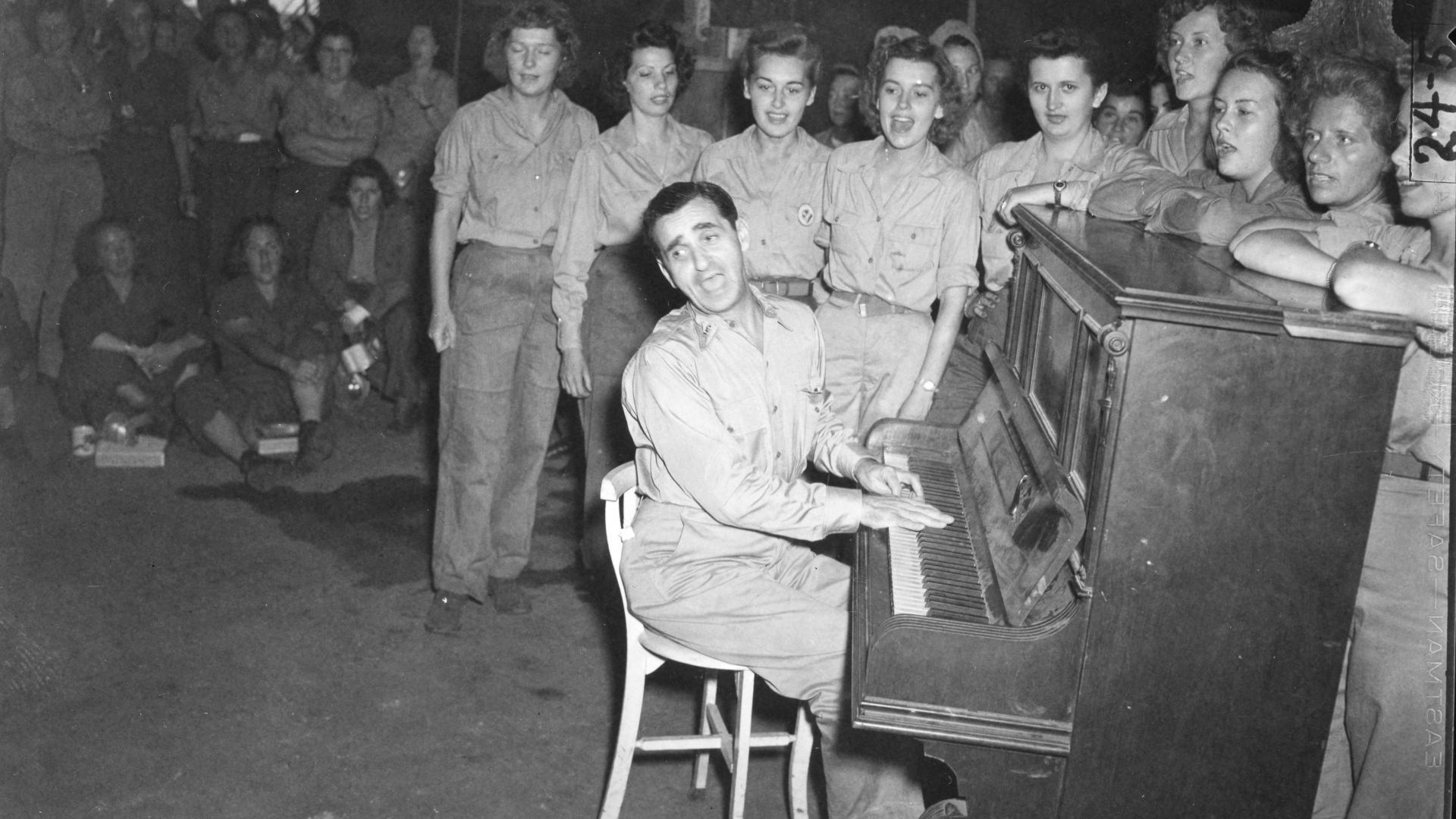“I really can’t read music,” Irving Berlin admitted. “Oh, I can pick out the melody of a song with one finger, but I can’t read the harmony. I feel like an awful dope that I know so little about the mechanics of my trade.”
For an awful dope who couldn’t read music, Berlin created a string of epoch-defining songs that became practically the soundtrack to the 20th century. Among his 3,000-plus compositions you’ll find There’s No Business Like Show Business, White Christmas, God Bless America, Easter Parade, Puttin’ on the Ritz and Anything You Can Do (I Can Do Better). He wrote 30 Broadway shows, 17 Hollywood musicals and composed unforgettable songs for so many occasions it was said that without Irving Berlin, America would have no holidays.
For Jerome Kern, “Irving Berlin has no place in American music – he is American music”. George Gershwin considered Berlin to be “the greatest songwriter who ever lived” and “the very first to have created a real, inherent American music”. Cole Porter included him in the lyrics of Anything Goes, writing, “You’re the top, you’re a Waldorf salad; you’re the top, you’re a Berlin ballad”.
What prompted these remarkable tributes from peers and, in some cases, rivals? His songs could be deeply sentimental but avoided mawkishness. Lyrically he could turn the most clunking cliche into lilting poetry by the meticulous locating of a phrase within a melody. His compositions rarely strayed from the four topics he identified as the most important for songwriters – home, love, self-pity and happiness – but what really set Berlin’s work apart from the rest was how it was never less than deeply sincere.
It’s possible that a lack of formal musical training may have contributed to Berlin’s creation of Gershwin’s definitive “real, inherent American music”. While he underplayed his skill at the piano as picking out tunes with one finger, Berlin only ever wrote and played in F sharp, using mainly the black keys of the keyboard. He transposed his songs into different keys by working at a piano with a lever that shifted the sound into any key while his fingers on the keyboard were still playing in F sharp.
A friend once advised Berlin to invest in piano lessons. “After two days I realised I could have written two songs in that time and made myself some money,” he said. There were no more lessons and a lot more money.
Without the shackles of conventional technique, Berlin was able to forge a musical path that passed between the concert hall, vaudeville theatre and rocking chair on the porch while encompassing them all. He wrote songs that were at once simple and sophisticated, a new sound, a young sound for a young country just beginning to forge for itself a confident, global identity on its own terms.
Yet the Irving Berlin story began a very long way indeed from the nation he loved and captured in God Bless America.
Countless Europeans have crossed the Atlantic in search of new opportunities and a new life, striking out into a dark, forbidding ocean, heading for a strange continent invisible over the horizon. If that prospect weren’t daunting enough, for the young Irving Berlin and his family the crossing was the easy part.
He was born Israel Baline in Tyumen, western Siberia, not far from the border with Kazakhstan. His father Moses was an itinerant Jewish cantor, originally from what’s now Belarus, whose travels had taken him, his wife Lena and their eight children deep into the heart of Russia. In the early 1890s, a wave of vicious pogroms washed across the nation, reaching even as far as remote Tyumen where Berlin’s earliest memory was of sitting in the dark by the roadside watching his home burn to the ground.
Having lost almost everything, the Balines embarked on an epic journey across Europe. First, they travelled west to Moses’ home city of Tolochin, where he was advised by family members to keep going and make for America. By the time the family reached Antwerp and boarded the liner Rijnland in the late summer of 1893, they had already travelled 3,000 miles.
The Balines arrived in New York on September 14 that year when Israel, known as Izzy, was five years old. Moses found work in a kosher slaughterhouse but when he died in 1896 Izzy left school for a job as a newspaper seller, bringing to an end his formal education at the age of eight.
Having acted as a guide for a Bowery-based ballad singer named Blind Sol, Izzy Baline began singing on the streets himself and learning valuable lessons about which songs suited which audiences and earned the most coins. At 16 he became a singing waiter at a beer hall in Chinatown, where he taught himself rudimentary piano skills after closing time and began writing his own material.
In 1907 he sold his first song, Marie from Sunny Italy, which, according to legend, was misattributed in print to “I. Berlin” and the name stuck, but it’s more likely Israel Baline had already chosen a more Anglicised version of his name. Within a few months all his work was being credited to Irving Berlin, to which he changed his name officially in 1911.
That year Alexander’s Ragtime Band became his first smash hit and Irving Berlin had truly arrived, an American success story from the wilds of Russia who gave the nation its soundtrack.
His thank-you letter to his adoptive country was God Bless America, a song published on the eve of the second world war that became a second national anthem. Berlin assigned all royalties from the song to the Boy Scouts and Girl Scouts of America with the comment: “A guy born in Russia who comes to America and winds up becoming Irving Berlin should be very grateful”.
White Christmas, a song dashed off in a hurry to replace another as part of the soundtrack to the 1942 Bing Crosby film Holiday Inn, was and remains his most successful song of all time, selling more than 100 million records and 140 million copies of the sheet music. Berlin hadn’t considered White Christmas to be anything special and handed the newly minted composition to Crosby on set with some hesitation.
“Bing’s not one to throw his arms around and get excited,” Berlin said later. “He just took his pipe out of his mouth and said: ‘Irving, you don’t have to worry about this one.”’
The hardships of his background, especially when compared with his contemporaries (“Cole Porter knew how to talk to waiters, Irving Berlin was a waiter,” as British jazz critic Benny Green put it) meant Berlin never took either his talent or his extraordinary success remotely for granted, even towards the end of his remarkably long and successful life.
“It’s nice to hear complimentary things about the standards I’ve written over the years,” he said at the age of 87. “But I can always hear a little bird chirping, ‘yeah, OK, but what have you done lately?’”




